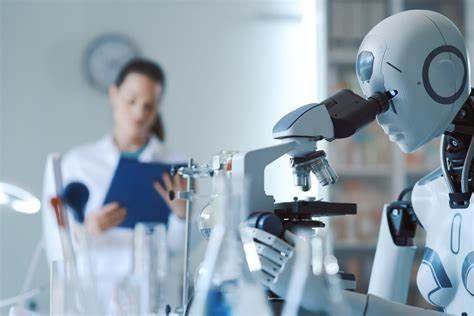
In the ever-evolving field of genomics, the integration of Artificial Intelligence (AI) is proving to be a game-changer. From decoding the human genome to predicting disease risks, AI is transforming how we understand and utilize genetic information. As the volume of genomic data grows exponentially, traditional methods of analysis are no longer sufficient. Enter AI—a powerful tool that is not only accelerating genomics research but also unlocking new possibilities for personalized medicine, drug discovery, and beyond.
What is Genomics?
Genomics is the study of an organism's complete set of DNA, including all of its genes. It aims to understand the structure, function, and evolution of genomes, as well as their role in health and disease. With the advent of technologies like next-generation sequencing (NGS), scientists can now generate vast amounts of genomic data. However, analyzing this data manually is time-consuming and prone to errors. This is where AI steps in.
How AI is Transforming Genomics Research
1. Accelerating Genomic Data Analysis
The human genome consists of over 3 billion base pairs, and analyzing this data manually is a monumental task. AI algorithms, particularly machine learning (ML) and deep learning (DL), can process and analyze genomic data at unprecedented speeds.
For example, AI can identify patterns in DNA sequences, predict gene functions, and detect mutations associated with diseases like cancer.
2. Predicting Disease Risks
AI is being used to analyze genetic data and predict an individual’s risk of developing certain diseases. By combining genomic data with other factors like lifestyle and environment, AI models can provide personalized risk assessments.
For instance, companies like 23andMe and AncestryDNA use AI to offer insights into genetic predispositions for conditions like Alzheimer’s, diabetes, and heart disease.
3. Drug Discovery and Development
Traditional drug discovery is a lengthy and expensive process. AI is streamlining this by identifying potential drug targets and predicting how different compounds will interact with specific genes.
In 2020, AI-driven drug discovery company Insilico Medicine used AI to identify a potential drug candidate for fibrosis in just 18 months—a process that typically takes years.
4. Precision Medicine
Precision medicine aims to tailor treatments based on an individual’s genetic makeup. AI is playing a crucial role in this by analyzing genomic data to recommend personalized therapies.
For example, AI is being used to match cancer patients with the most effective treatments based on their tumor’s genetic profile.
5. Understanding Complex Genetic Interactions
Many diseases are caused by the interaction of multiple genes and environmental factors. AI can analyze complex datasets to uncover these interactions, providing deeper insights into conditions like autism, schizophrenia, and diabetes.
Real-World Applications of AI in Genomics
1. Cancer Genomics
AI is helping researchers identify genetic mutations that drive cancer growth. Tools like IBM Watson for Genomics analyze genomic data to recommend targeted therapies for cancer patients.
2. Rare Disease Diagnosis
AI is being used to diagnose rare genetic disorders by analyzing patient genomes and identifying mutations that may have been missed by traditional methods.
3. Agricultural Genomics
Beyond human health, AI is being used in agriculture to develop crops with improved yield, disease resistance, and climate adaptability.
Challenges and Ethical Considerations
While the potential of AI in genomics is immense, it is not without challenges:
Data Privacy: Genomic data is highly sensitive. Ensuring its security and protecting patient privacy is critical.
Bias in AI Models: AI algorithms are only as good as the data they are trained on. If the data is biased, the results may be too.
Regulatory Hurdles: The use of AI in healthcare and genomics is still relatively new, and regulatory frameworks are evolving.
The Future of AI in Genomics
The future of AI in genomics is incredibly promising. Here are some trends to watch:
Single-Cell Genomics: AI will enable the analysis of individual cells, providing unprecedented insights into cellular diversity and function.
Synthetic Biology: AI will play a key role in designing synthetic genomes for applications in medicine, agriculture, and environmental conservation.
AI-Driven Clinical Trials: AI will optimize clinical trials by identifying suitable candidates and predicting outcomes.
Conclusion
The integration of AI into genomics research is revolutionizing the field, making it faster, more accurate, and more accessible. From personalized medicine to drug discovery, the possibilities are endless. As we continue to harness the power of AI, we are not only advancing our understanding of the human genome but also paving the way for a healthier, more sustainable future.
Call-to-Action:
What are your thoughts on the role of AI in genomics? Do you think it will revolutionize healthcare as we know it? Share your opinions in the comments below, and don’t forget to subscribe to our blog for more insights into the latest trends in genomics and biotechnology!

Yaazh Xenomics is a leading biotechnology company based in Coimbatore, Tamil Nadu, India, specializing in comprehensive genomic solutions. As a DNA testing laboratory, we offer a broad spectrum of services, including DNA sequencing, RNA Sequencing, Sanger Sequencing, 16s rRNA, 18s rRNA, ITS, COI, RBCL, Matk gene Sequencing for DNA Barcoding, gene expression analysis, SNP analysis, Next-Generation Sequencing (NGS), Various Medical Genome testing, Exome Sequencing, Gut Microbiome Test, Metagenome Sequencing, Whole Genome Sequencing (WGS), Transcriptome Sequencing using advance NGS platforms like Nanopore, Illumina, MGI, Thermo. Also, we provide advance Bioinformatics, Customized Bioinformatics and a variety of other genetic testing and Molecular testing.